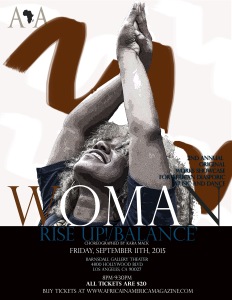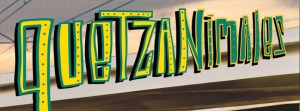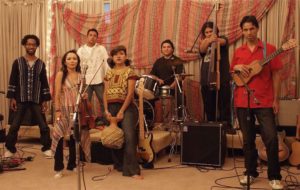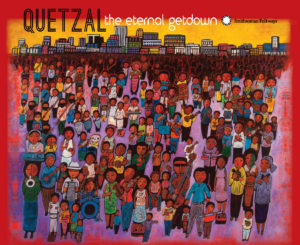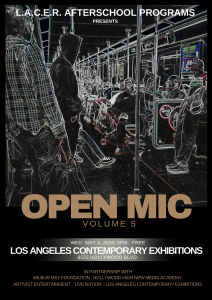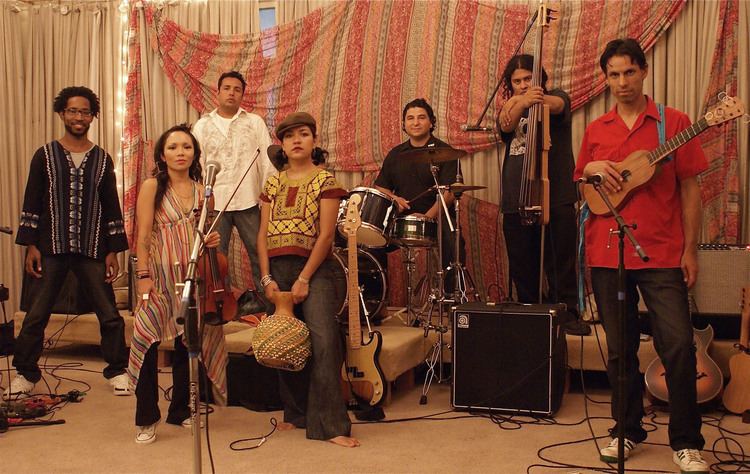
GRAMMY® Winning East L.A. Band Quetzal Celebrates 25 Years
Quetzal is an ensemble of highly talented musicians, joined for the goal of creating good music that tells the social, cultural, political, and musical stories of people in struggle. Martha Gonzalez (lead singer, percussionist, and songwriter) calls it an “East LA Chican@ rock group,” summing up its rootedness in the complex cultural currents of life in the barrio, its social activism, its strong feminist stance, and its rock and roll musical beginnings. Besides being a rock band, the group and its members participate in a much larger web of musical, cultural, and political engagement.In 1992, Chicano rock guitarist, Quetzal Flores discovered the burgeoning revival of traditional music of Veracruz called son jarocho. This jaranero resurgence began in Veracruz in the late 1970’s. It crossed the border into California, where it and other Mexican folk music traditions had already been appropriated by Mexican Americans as an expression of mexicanidad-Mexican roots. Local Chican@ music groups performed the music at rallies, marches, and events flowing from the Chicano vein of the Civil Rights Movement. Flores took up the music and its folk instruments and incorporated them into his own musical blend, which included sounds and sentiments from many sources: The Smiths, Ruben Blades, Stevie Wonder, and much more.
Flores’s approach to music, however, was influenced by much more than the East L.A. musical soundscape of Mexican musica ranchera, salsa, Chicano Rock, R&B, and international popular music. Raised in a family of social activists, he saw music as a means to work for social justice as well as a form of creative expression. For members of Quetzal, music expresses the ultimate struggle for dignity.
The band began in 1993 in a Chicano owned cafe, Troy cafe, in the Little Tokyo neighborhood of Los Angeles. The group had emerged out of a particularly contentious time generated by events such as the 1992 Los Angeles uprising, the 1994 Proposition 187 campaign (to deny medical and public services to undocumented immigrants and public education to undocumented children), and the repercussive reach of the Zapatista insurrection in Mexico. These events spurred a powerful synergy, in which avenues of expressive culture such as music and public art emerged as platforms from which to voice marginalized people’s desires, opinions, and resistance to the conditions in which they found themselves.
Martha Gonzalez joined the group in 1995, Martha Gonzalez who was born and raised in East Los Angeles joined the group shortly after it was formed. Gonzalez grew up singing and learning the sentiment of Mexican music with her two siblings. Encouraged by their father, the youthful trio sang with mariachi ensembles in the greater Los Angeles area. Gonzalez completed her PhD in the Department of Gender, Women, and Sexuality Studies at the University of Washington and as an undergraduate studied drumming and dance of Ghana and Cuba at UCLA. Her musical background gave her a solid foundation to contribute as a performer, lyricist, and composer. They helped catalyze the Seattle Fandango Project in 2009 when Martha Gonzalez moved to Seattle to complete her PhD in Gender, Women & Sexuality Studies from the University of Washington.
Martha’s research on the transnational music movement across the Americas and Europe, with a special focus for innovations of women in the music and dance of son Jarocho awarded her a Fulbright-Garcia Robles Award and a Ford Foundation Dissertation Fellowship. Martha released her Fulbright research project Entre Mujeres:Feminine Translocal Music Composition, as a CD compilation. She affirms a strong female perspective in the group’s creative projects. In her words, “part of being in the band is having a Chicana feminist analysis.
The presence of women in the group is not ‘eye candy’ or a tokenized gesture toward balancing any sort of gender scale: it’s an honest recognition of the poetic, musical, and compositional strengths the female musicians in the community possess.” A fan of old school artists, Martha cites some of her biggest influences in music are Chaka Khan, Aretha Franklin, Gladys Knight and Joni Mitchell.
The proactive strategy of Quetzal and other artists was to maneuver through the societal problems that were affecting the communities in which these artists were living. As a prominent force in this East L.A. creative culturescape, Quetzal vividly portrays how music, culture, and sociopolitical ideology come together in a specific place.
In 2012 at the 55TH ANNUAL GRAMMY® AWARDS Quetzal won Best Latin Rock, Urban or Alternative Album for Imaginaries, the 5th release for the band. ‘Imaginaries’ begins with the dark but lively “2+0+1+2=Five,” about a barren landscape ruined by environmental abuse; set in 5/4 time, the composition is punctuated by lush strings, organs and eerie vocals. It sets the tone for a fiery, innovative, percussive and bilingual album that fuses many touchstones of the East LA plurality―including the title track, a taut mix of rock and R&B, and the Veracruz-informed “Tragafuegos.”
Listen to “Imaginaries”
Listen to “Tragafuegos” (Fire Breathers)
Watch “Todo Lo Que Tengo”
Watch “Estoy Aqui” (I Am Here)
“Imaginaries” is the 35th release in the Smithsonian Folkways Tradiciones/Traditions series since 2002. The series, a co-production with the Smithsonian Latino Center, showcases the diverse musical heritage of the 50 million Latinos living in the USA.
Current Band Members
Martha Gonzalez — lead and backing vocals, congas, chekere, tarima, cajon, tap dance, jarana
Tylana Enomoto — backing vocals, violin
Juan Perez — electric bass, baby bass, double bass
Quetzal Flores — jarana jarocha, requinto jarocho, bajo sexto, electric and acoustic guitars
Quincy McCrary — lead and backing vocals, Rhodes piano, Hammond B3, keyboard
Alberto Lopez — percussion
Former band members
Gabriel Tenorio
Gabriel Gonzalez
Daphne Chen
Kiko Cornejo Jr.
Dante Pascuzzo
Edson Gianesi
Danilo Torres
Camilo Landau
Rocio Marron
Ray Sandoval
Yunior Terry
Lilia Hernandez
Ruben Gomez
Maceo Hernandez
Robert Guerrero
Anton Morales
E Anthony Martinez

